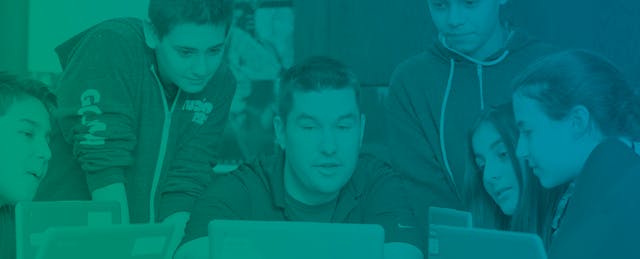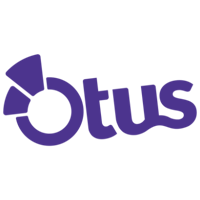Chris Hull is a busy guy. He teaches 7th grade social studies in Highland Park, Illinois. He also helps run Otus, which he describes as a student performance platform—a learning management system that also spans classroom management, curriculum, and assessment.
Hull and fellow teacher, Pete Helfers, started to develop Otus with cofounder Andy Bluhm after establishing a 1:1 computing program and noticing how much time teachers had to spend on technology, instead of teaching. This year, the platform was a finalist for two SIIA CODiE awards. And Chris himself was named one of the National School Boards Association's 2016 20 to Watch educators.
EdSurge recently spoke with Chris about where Otus is today, and where it’s going.
EdSurge: How did you get your start in edtech?
Chris Hull: I really hoped I was going to be a professional basketball player. I thought that was going to be my future, but I always knew I wanted to teach. I actually had the opportunity to pursue playing professionally, or to go teach, and I made the choice to throw myself fully into teaching.
The first year I was replacing a teacher who had been here for over 30 years. She was this person who had brought a curriculum to the entire state of Illinois. She’d brought programs into our district and she served as a mentor. I was looking at her material and I’d say, “Oh, let me take this idea and adapt it.” I kept on looking at how we could take these skills of being able to read, write, and think, and take them to the next level.
At the time, I was just getting into technology. One of the activities that this former teacher would do was have the students write a blog and reflect every day. This was being done in notebooks. I thought, “Man, how do you carry around 125 notebooks?”
I want my students to write every day. I want my students to be able to have differentiated assignments and to be able to find the one that is most interesting. But the tool of a notebook, the tools of creating a poster board—they weren’t allowing me to reach all of my students.
In my second year, we had an entire unit where we did everything on Wikispaces. I realized the potential of using the Internet every day—that there could be fewer limitations on what we could do. I’d be able to differentiate for every student.
My cofounder Pete Helfers and I would frequently meet in our classrooms talking about how we could improve learning for our students, and what our ideal classroom would be. We had seen all of these edtech tools out there and, instead of our lives being better in the classroom, we were jumping between 15 and 20 different apps. Our vision was to create a platform giving students, teachers, school leaders, and families centralized tools and actionable insights into the learning of students.
What motivates you, both as a teacher and an entrepreneur?
Teachers … we share and we steal. And not steal in a bad way. We share and we steal ideas because we want to provide the best for our students. We’re really a community that collaborates and does anything to help student learning. That really motivates me to continue.
Failure also motivates me. In my classroom, I try to build a culture of honesty, respect, and persistence. When I say we risk failure, I mean we’re trying our absolute best. Building this team that is Otus, we try to have the same core philosophies as I have in my classroom. If you’re honest, respectful, and you're persistent—if you risk failure—you’re really able to motivate each other to do amazing things.
With Otus I have better knowledge of who my students are. With the knowledge of how they learn—their passions, their perceptions, the way they think, the subjects that are interesting to them, what they do well, what areas they need to be supported in—I’m better able to tailor the resources, tools, activities, and assessments in my class to further their performance.
What challenges you?
As a former basketball player, I strive to, every year, shoot 100%. I want to reach every single student. I want to maximize learning in my classroom for every one of them, and every year I fall short. I’m not able to do that for all 125 of my kids.
Trying to gather all of their learning profile elements—like what were their assessment scores, what were their behaviors last week, and being able to track how many times was this student getting out of his desk, or doing IEP accommodations—all of that requires a lot of apps. When you use one tool in isolation, it’s is easy to use. The problem as a teacher is when you're trying to use 15 easy tools, that's not easy to do. When you’re trying to put them into practice, and you’re trying to bind them together to create an entire classroom experience, and then culture . . . all of a sudden the tools become the prominent aspect of the class, instead of the learning.
With Otus, the idea is that if those tools are in one place, then you can pick and choose which tools you want and when; it’s in one platform with one workflow. And all of a sudden, you have found that there is more time to go talk to the students, to work with the students, to mentor the students.
What are you most proud of?
I'm most proud of how an idea that began in my classroom, with my students, has grown into a solution that helps thousands of students, families, teachers, and administrators across the country each and every day. And that the experiences I have as I stay teaching continue to shape Otus.
What’s next for Otus?
The discussion of what is next is one of my favorite topics, like the talks Pete and I would have in our classrooms when Otus began. We talk as a team but we also love to have these conversations with teachers, administrators, students, and parents whenever we can.
Because I’ve stayed in the classroom, these conversations are easier, and we are able to feel the pain of today’s educators in real time. We take this and work on solving these problems faster and better than anyone else.
So what’s next for Otus? We are releasing some great features helping better personalize students’ learning and providing a more complete story of their growth for educators and families. We're also excited to continue our conversations about how technology can help create more engaging classrooms, facilitate greater differentiation and individualization, capture data effortlessly, and allow educators to visualize all this information together.



